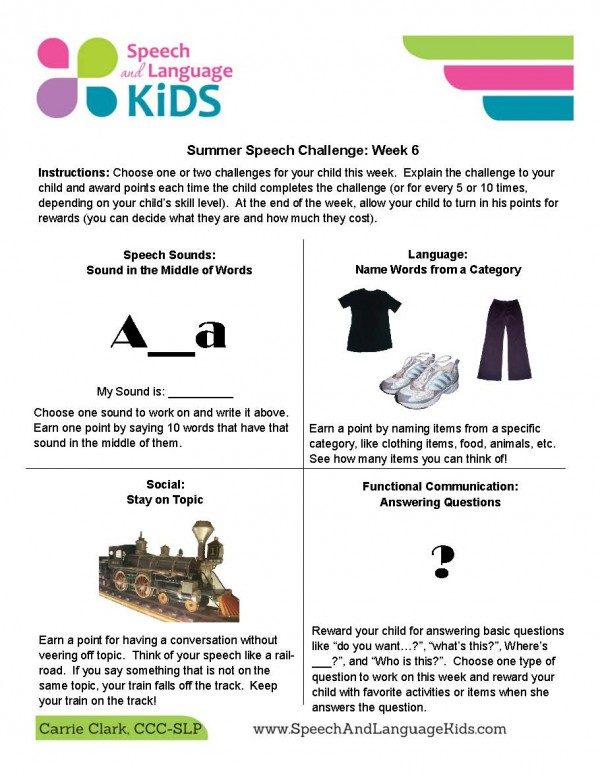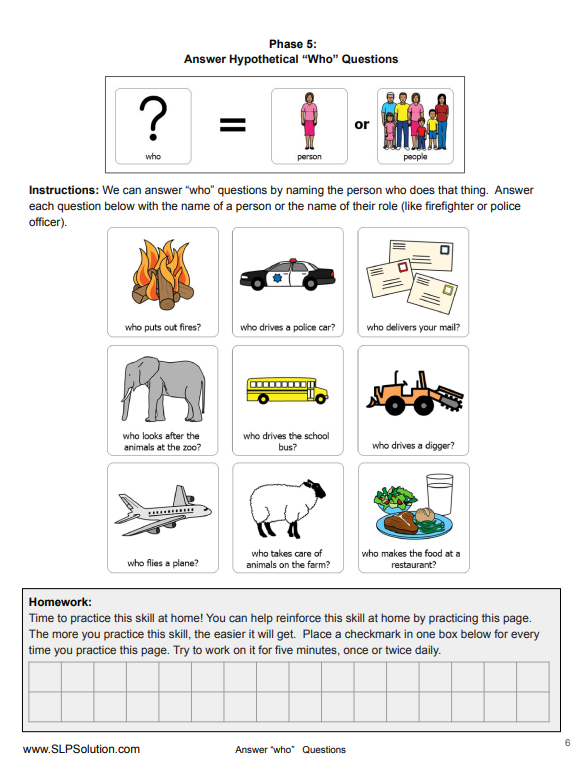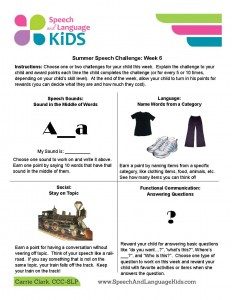Summer Speech Therapy Homework – Week 6
Welcome to week six of our Summer Speech Challenge for Parents! Click here if you want to go back and start from week 1!
Summer Speech Therapy Homework Challenge:
To recap, our Summer Speech Challenge is a new challenge for your child each week of this summer. These are simple activities that are meant for you to be able to work into your daily routines. There are four different challenges each week so you can pick which one is best for your child. If you feel like your child struggled with last week’s and you’d like to try it for another week, go for it! Or, you can push ahead and do this week’s activity anyway. Sometimes our children do better if we switch to something else.
Avoid the Battle:
I want to make a quick note here that nothing we’re doing here should be a battle! If your child is struggling to do the skill that you’ve selected, try to either make it easier or switch to something else. The reason that we speech-language pathologists go to school for 5+ years is so that we can know exactly how to tweak things when the child isn’t getting it. So don’t feel bad if it’s just not clicking for you and your child! Switch to something a little easier to keep the momentum going and check in with your child’s speech-language pathologist. This shouldn’t replace the advice of a licensed speech-language pathologist!
Choose an Area:
You’ll want to pick one or two challenges for your child to work on this week. Here’s a quick breakdown of the 4 areas that are included in our summer challenge so you can pick which skills your child needs.
- Speech Sounds: Choose this area if your child is struggling to say a sound correctly in conversation. You’ll only choose one sound to work on at a time so don’t go crazy! You can always come back and repeat this process with another sound later.
- Language: Choose this area if your child struggles with any parts of language. This can include anything from using full, grammatically-correct sentences to knowing the names for different vocabulary words. If it has to do with putting together sentences and getting your ideas across using words, then language is your area.
- Social Skills: Choose this area if your child needs help with interacting appropriately with others. We’ll practice a variety of interaction skills with this area.
- Functional Communication: Choose this area if your child is just beginning to talk or is only saying 1-2 words at a time. This area will focus on basic communication skills for our non-verbal children and new talkers.
Challenge Week 6:
Let’s get started with this week’s challenge!
Instructions:
- Choose one (or max two) areas below that your child needs to work on
- Print out the visuals for the challenges and cut out the ones your child needs
- Post the visuals somewhere so you and your child will see it frequently
- Read the challenge rules and explain it to your child in language she will understand
- Award points as your child completes the challenge throughout the week (view week 1 for ideas for this)
- Allow your child to redeem points as you see fit
Week 6 Picture Download:
Click Here to Download the PDF
The Challenges:
Speech Sounds: Sound in the Middle of Words
For the speech summer challenges, you’ll want to choose one sound to work on. It gets complicated when you start adding in multiple sounds so just choose one that your child needs to work on. It can be one he’s already been working on in speech or an entirely new one.
Last week, your child practiced saying his target sound at the end of words. Now it’s time to work on that sound in the middle of words. This is usually the hardest position to master. It’s OK if your child wasn’t totally perfect at the ones at the beginning or ends of the words. Some children will benefit from switching gears and working on the sound in a different position.
For this week’s challenge, allow your child to earn a point by saying a word that has the target sound somewhere in the middle of the word. For example, if the sound is /g/, then he could say “bagel” or “sugar”. If your child is really good at this, you may want to switch to one point for every 5 or 10 words.
At the beginning, you may have to say them for your child and have him repeat them back. Once he gets a little better, see if he can say them on his own. He can either think of the word on his own or you can show him a picture of a word that has the sound in the middle (Google image search is very helpful for this, but keep safe search on!). And if you need some ideas, a quick search of “word-medial /g/” will get you there!
Why This Helps: Your child benefits from practicing this sound in a variety of word positions. We say each sound many times every day so the more your child can practice, the more familiar he will become with the new way of saying this sound.
Language: Name Words from a Category
Categorization is an area that our children with language problems may struggle with and it can greatly improve vocabulary development when we work on it. This week, give your child one challenge point every time she can name 10 items from a category. For example, can she name ten clothing items? Ten animals? Ten body parts?
You may have to give cues and prompts (like, “it has black and white stripes, it looks similar to a horse, and it lives in the zoo”) to get your child to ten. But keep practicing this until your child can do this easily. If your child needs a little more of a challenge, choose harder categories or have your child come up with 20 items.
Why This Helps: Grouping vocabulary words by category helps your child’s brain make connections between words. And the more connections that are made, the more likely a child is to remember and be able to easily access that word. This is also a great way to add new vocabulary to your child’s repertoire. You can show your child pictures of other items that fit into the category that you are working on.
Social Skills: Topic Maintenance
Staying on topic during a conversation can be difficult for our friends with social language problems. This week, award your child a challenge point for staying on topic for a certain number of minutes. If your child is younger or is struggling with this, you may want to make the time short, like one or two minutes. Or, if your child is older or is making good progress with this skill, you can up the time to 5-10 minutes.
This is a great one to work on in the car because sometimes the only time we can get our children to stop moving and have a conversation with us is when they’re strapped into a car seat!
Explain to your child first what it means to stay on topic and what it means to go off topic. Give your child an example and a chance to tell YOU when YOU stray off topic. Do this on purpose so your child has an example to go by. Then, tell your child that you’re going to start a stopwatch and have a conversation with your child. If your child can stay on topic the whole time, he’ll get a challenge point!
If your child veers off topic, point it out and help your child understand what topic he is now talking about and what the original topic was. Most likely, this won’t seem like a topic shift to him because it made sense in his head. You’ll need to explain how no one else knows how his mind jumped to the new topic.
If your child is resistant to this (or is struggling a lot), you can switch it and have him earn points by identifying when you veer off topic. For example, start a conversation about favorite types of pizza and then start talking about trains. Tell your child to let you know when you start talking about something other than pizza.
Why This Helps: Staying on topic will help a child have longer conversations with peers and develop deeper friendships. Once your child gets good at this, you can help him understand how to smoothly transition between topics, such as by using language devices like “speaking of ___, that reminds me of a time when ____.”
Functional Communication: Responding to Simple Questions
This week, choose one type of question to help your child practice answering. Here’s a list of choices with the easier ones being closer to the top and the harder ones toward the bottom. See where your child is in this hierarchy and select one to work on:
- Yes/no questions about basic needs (are you hungry?)
- “What is…” questions (What’s this?)
- “What doing” questions (What is he doing?)
- “Where” questions with pointing (Where’s mommy? Where’s your puppy?)
- “Who is…” questions (Who’s this? or Who is running?)
Choose one of these question types and reinforce your child every time she answers a question like that this week. If your child will work for challenge points, you can try that. If not, you can reward your child with favorite activities (like blowing bubbles or swinging) or favorite items (like food or toys).
At first, you may have to ask the question and then immediately model the answer (especially if your child is prone to repeating your question). For example, you could say “Are you hungry? Yes!” Then, help your child repeat the answer after you. You can also help your child use gestures to answer questions, such as pointing at something when you ask where it is or helping her nod or shake her head for yes/no.
As your child gets better at this, ask the question and then pause to see if she can answer the question on her own first. If not, provide cues and help for your child to answer correctly. Keep in mind that it’s best to work on one question type at a time instead of expecting your child to answer a bunch of different question types.
Why This Helps: We answer questions all the time as adults! Helping your child practice these very basic question types will help her begin to develop the skills to answer more complex questions later on.
Recap:
OK, you should have your challenge(s) by now. Here’s a recap of what you need to do:
- Print out the pictures for this week’s challenges and cut out the ones you need (see button below)
- Post the challenge picture on the wall and explain the challenge to your child
- Award points throughout the week whenever your child completes the challenge
- Encourage your child to practice and earn points as often as possible

About the Author: Carrie Clark, MA CCC-SLP
Hi, I’m Carrie! I’m a speech-language pathologist from Columbia, Missouri, USA. I’ve worked with children and teenagers of all ages in schools, preschools, and even my own private practice. I love digging through the research on speech and language topics and breaking it down into step-by-step plans for my followers. I graduated from Truman State University in Kirksville, MO with a masters degree in Communication Disorders.
Connect with Me:









Looks fantastic! Lots of activities and useful information to explore and learn